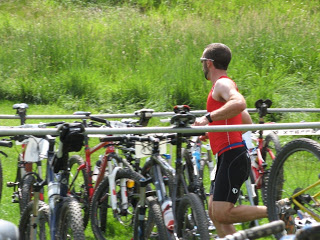In just 1.5 weeks I have my first Xterra race of the season…the Xterra Buffalo Creek, southwest of Denver. For those readers that are unfamiliar, Xterra is an international off-road triathlon race series. Each race typically consists of a 1 mile open water swim, a 15-25 mile mountain bike, and a 5-7 mile trail run, often with lots of elevation gain thrown in for good measure.
This year, as both a personal goal and as part of a new book I’m working on, I’m attempting to qualify for the Xterra national championships, which take place in Utah in September. There…I’ve said it publicly, so now I’ll have some accountability for achieving that goal! Achieving it certainly won’t be easy, but I also believe it’s attainable. I’ve been training hard, eating well, had some valuable learning experiences in races in years past, and I’m highly motivated for the 2009 race season. Of course, I also live in arguably the fittest city in the fittest state of the country, competing in the most competitive age group of the most competitive region for Xterra (all of those statements are open to interpretation, but you get the general idea…).
With the race close at hand, I thought the time was right to do a series on GF nutrition for athletes. Whether you’re a gluten-free athlete, or an athlete who adheres to a gluten-free diet, this info will be useful to you. Since this is a blog about the gluten-free lifestyle, I’ll focus mostly on GF nutrition, and not as much on training. However, the two are intimately related, and I’ll explain how when appropriate in subsequent posts.
In traditional thinking (and traditional athlete diets) gluten plays an important role, in the sense that it’s heavily present in wheat-based breads and pastas that athletes use to carbo load leading up to a race, and it’s present in the celebratory beers they drink after the race. The gluten-free endurance athlete has to come at things from a slightly different angle, one that may actually give us a slight advantage over our competitors (more on that to come).
As a caveat, let me say now that my perspective on GF nutrition for endurance athletes is geared toward events that have longer durations, with periods of high intensity exhertion thrown in (ski mountaineering racing, Xterra, adventure racing). These are events that typically last 2 hours to as many as 9 hours or more. This is important, because it affects how our bodies (and our muscles in particular) recruit and use energy.
For my flavor of racing, I have a hierarchy of nutritional needs. A) I need fuel for endurance (long duration). B) I need fuel for speed (high intensity). C) I need fuel for explosiveness (to tackle a climb, burst past a competitor, sprint to a finish). D) And of course, through it all, I don’t want to bonk (hit the wall).
Keeping those needs in mind, posts over the subsequent days will cover four major topics: 1) nutrition while training, 2) pre-race nutrition, 3) during race nutrition, and 4) post-race recovery nutrition.
Until tomorrow…
Pete

Another book? Wow! You rock, Pete. I am sure this series will be really helpful to gf endurance athletes and helpful to you in making yourself accountable. Although I don’t see you having issues with being accountable–your efforts and successes are well documented here and elsewhere!
Shirley